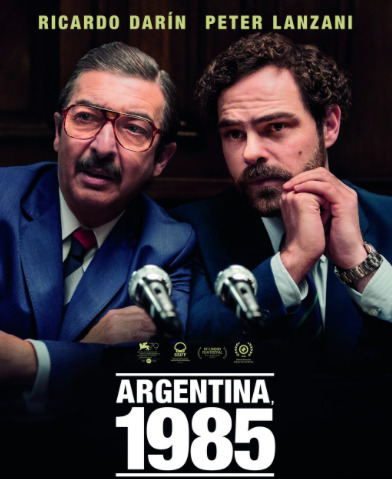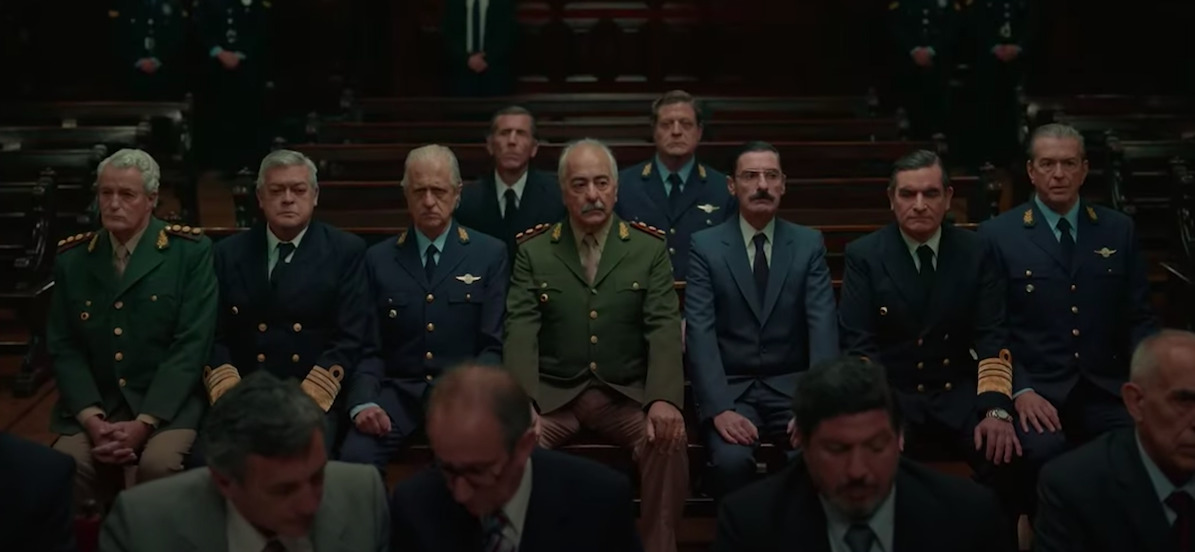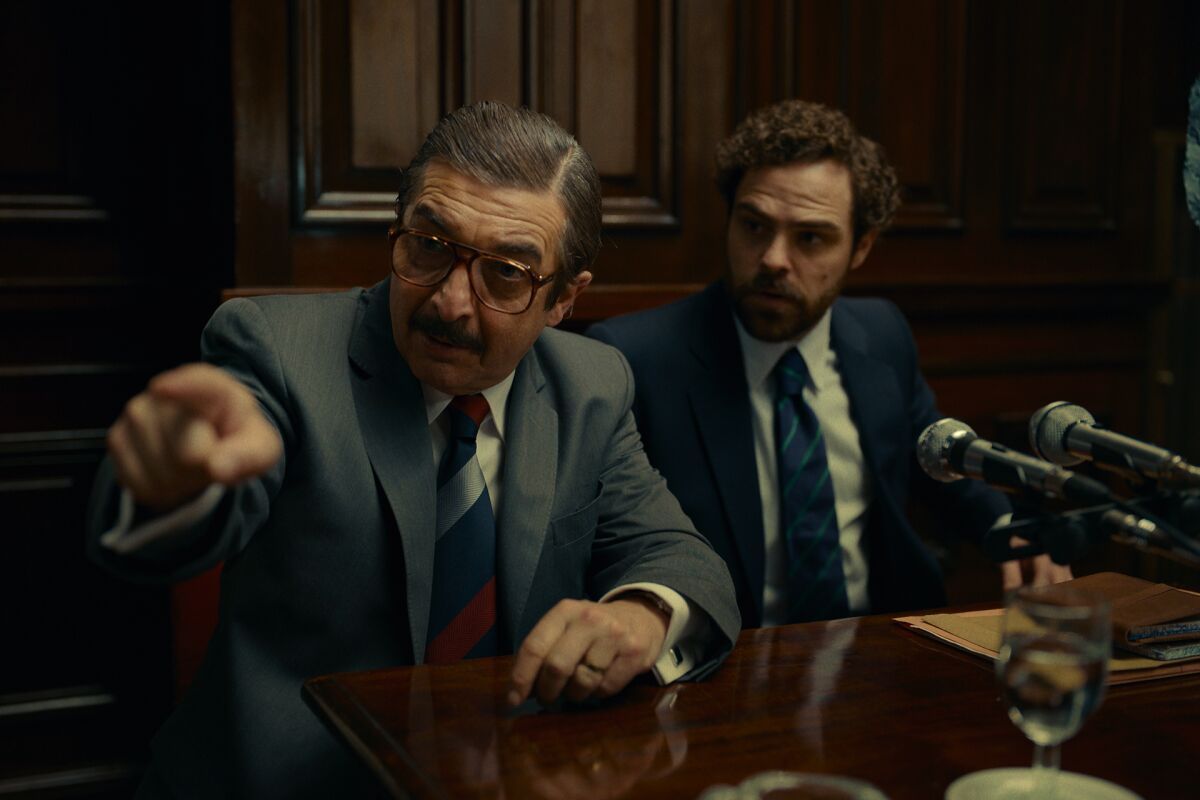
This year marked Argentina’s triumph on multiple fronts, from the victory of the World Cup in the field of sports, to having a motion picture arriving to the Oscar’s shortlist and Golden Globes nominees. The film in question is Argentina, 1985, directed by Santiago Mitre and presented at the 79th Venice International Film Festival.
The story is set in the year 1985, when Argentine prosecutors Julio César Strassera (Ricardo Darín) and Luis Moreno-Ocampo (Peter Lanzani) find themselves engaged in an unprecedented trial, the one against the leaders of the military dictatorship that ruled the country from 1976 to 1983, including President Jorge Rafael Videla (Marcelo Pozzi).
Argentina, 1985 is a love letter to the Trial of the Juntas, that prosecuted all those responsible for making “disappear” thirty thousand people from public life, because the government considered their political views unacceptable. The politicians whose hands are covered in blood include: Emilio Eduardo Massera (Joselo Bella), Roberto Eduardo Viola (Héctor Balcone), Armando Lambruschini, Orlando Ramón Agosti (Jorge Gregorio), Omar Graffigna, Leopoldo Galtieri (Carlos Ihler), Jorge Anaya (Sergio Sanchez) and Basilio Lami Dozo (Marcelo López).

The screenplay written by Santiago Mitre and Mariano Llinás powerfully retraces the joined efforts of the legal team that fought for the justice of the desaparecidos, who were secretly abducted and killed by a military government. Argentina, 1985 takes shape, through a phenomenal cast, within the walls of the house of a middle-class citizen. Julio with his wife Silvia (Alejandra Fechner), his daughter Verónica (Gina Mastronicola) and son Julián (Santiago Armas Estevarena), leads the life of a man who wants to guarantee a safe space in his home, as much as in the judicial offices where he works. His private life extends to the public: Strassera’s desire to protect his family expands to his people.
Santiago Mitre has dealt before with the exploration of characters battling between corrupt political systems and the urge to make honesty prevail. In his 2017 film The Summit, Mitre had already assigned Ricardo Darín with the role of a protagonist who found himself in the eye of the storm. This time in Argentina, 1985 the challenge is greater because it displays the time when ¡Nunca más! became the expression used by the people to repudiate State terrorism.
Argentina’s Dirty War is an execrable chapter in human history and the trial that brought down the top hierarchs of a fascist-like government was — as Strassera defined it — “the most important after the Nuremberg Trials.” The trial is not only an opportunity to come to terms with the crimes against humanity perpetrated and kept silent by the old regime, but to ensure once and for all the continuity of democracy in Argentina. The film shows the salient stages of the court proceedings as a nation-specific circumstance, to spread a universal warning. The depiction of this dark moment in Argentine history is important as a reminder for countries worldwide of what may happen when anti-democratic forces creep in our lives. The film is much more than a cautionary tale: it doesn’t want to preach to the masses, but it does retrace past events in a way that they can become extremely eloquent for our present time.

This call to attention comes during the speech given in court by Strassera, who makes an evocative consideration. He draws an analogy between a literary passage and the repression in Argentina: “Dante Alighieri in the Divine Comedy saved the seventh circle of hell for the violent ones: For all those who harm others through the use of force. And in that same hell, he submerged in a river of boiling and nauseating blood, a specific type of doomed, which the poet described as follows: ‘Tyrants are these who dealt in bloodshed and pillaging. Here, they lament their pitiless mischiefs’.” These words reverberate today in every nation confronting warfare.
Strassera managed to defeat the violence without any weapon. He was armed with words alone, which penetrated with more vigour than any method utilised by the military junta. This is why it seems appropriate to quote his closing argument to allow every reader to muse on the force available to humanity to behave conscionably: “Your Honour, this trial and its conviction are important and necessary for the Argentinian Nation, which has been offended by atrocious crimes. Their very atrocity turns the hypothesis of impunity into a monstrous one. Unless the moral sense of the Argentinians has descended to tribal levels, nobody can allow that kidnapping, torture and murder become political incidents. Or ‘collateral damage in combat.’ Now that the Argentinian people have recovered the government and control of its institutions, I take the responsibility of stating on its behalf that sadism is neither a political ideology, nor a war strategy, but a moral perversion. This trial and the sentence I am advocating for, we’re responsible for setting a peace based not in oblivion, but in memory. Not in violence, but in justice. This is our opportunity. It might be the last one. Your Honours, I wish to waive any claim to originality in concluding this argument. I want to use…a quote that doesn’t belong to me, because it already belongs to the entire Argentinian people. Your Honours, ‘Never Again. [¡Nunca más!]’”
Final Grade: A

